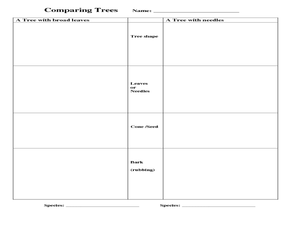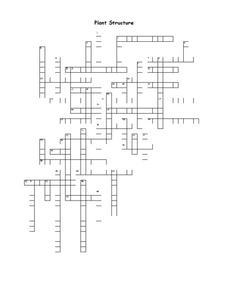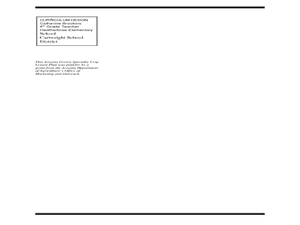Curated OER
The Effects of Solar Energy
Learners examine how solar energy is absorbed and used. In this solar energy lesson students complete several activities that allow them to better understand solar energy.
Curated OER
Plants Multiple Choice Activity
In this plant activity, students complete a set of 15 multiple choice questions about plants and their growth. A reference web site is given for additional activities.
Curated OER
Sunlight and Plants
Students design and conduct an experiment to discover the role of direct sunlight on plants during germination and after germination. They plant corn and lima beans in small containers which they place in direct sunlight from a window...
Curated OER
Home Sweet Home
Students examine the animals that live in trees. They identify their sounds, footprints and droppings. They draw pictures of the animals as well.
Curated OER
Plant Reproduction
In this plant reproduction worksheet, students complete a crossword puzzle with 36 questions. They identify the different plant reproductive features.
Curated OER
Air Pollution
Students identify the causes and effects of air pollution and how to reduce air pollution.
Curated OER
Introduction to Nutrition and Gardening
Students examine the different parts of a plant and each ones role. In this exploratory lesson plan students complete several activities including a game of charades.
Curated OER
Tree Friends
Students are introduced to tree structure and use. They identify their special tree using all senses except sight. Students identify six different internal parts within a cross section of tree trunk (bark, phloem, xylem, cambium,...
Curated OER
Chinese Proverb on Honesty
Students are introduced to concepts of honesty and responsible conduct after listening to a Chinese proverb. After sequencing the story and learning about Chinese culture, students plant marigolds. The children will monitor plant...
Curated OER
Plant Systems
In this plant systems worksheet, students write true or false for the 10 sentences about plant systems. Students then label the parts of the plant.
Curated OER
The History of Rice
Fourth graders investigate the history of rice by drawing a timeline of important dates. In this food history lesson, 4th graders research the history of rice, where it came from, and who first used it for food. Students...
Curated OER
Baby Peanut Plants
Science is a subject ripe with opportunities to read informational text. Kids read to learn about peanuts! They read an informational passage, fill out two comprehension worksheets, and then conduct a lab experiment on a peanut. The...
Curated OER
Nuts About Peanuts
First graders explore peanuts. In this peanut lesson, 1st graders examine the parts of peanut plants and identify them. Students plant their own peanut plants and chart their growth.
Curated OER
Ecosystems II
Middle schoolers engage in a instructional activity that is about the concepts related to the careful balance of an ecosystem. They identify the beneficial and harmful relationships that can exist with diverse populations in an...
Curated OER
Temperate Forest: Comparing Deciduous and Evergreen Trees
Students compare deciduous and evergreen trees. In this tree lesson, students list the differences between these two species of trees.
Curated OER
Plant Structure
In this plant science worksheet, students complete a crossword puzzle with 48 questions. They identify the different parts of a plant.
Curated OER
Just Bee-Tween Flowers!
Students examine the major plant and bee parts and the interdependency between bees and fast plants. They observe and record the stages of growth of fast plants, take photos of the plant's life cycle, and cross-pollinate plants.
Curated OER
Using the Prefixes 're' and 'non-'
In this prefixes worksheet, students complete 4 sentences using the 're' or 'non-' words in the word bank. Students make up 2 clue sentences with a prefix 're' or 'non'. Then students give a definition for 4 prefix words.
Curated OER
Four Parts of a Green Plant and the Functions of Each Part
Young scholars look into plants. In this science lesson plan, students discover the four parts of a green plant and the functions of each part.
Curated OER
Planting Phil's Garden
Students study how to care for plants. In this plant care lesson, students observe a plant care demonstration and examine flowers using their senses. They listen to Janet Wakefield's, What If Everybody Gave? They complete a community...
Curated OER
Clothesline Sleuth
Students explore the make up of fabrics. In this agriculture lesson, students examine the cotton and wool crops of the United States and discover how fabrics are created.
Curated OER
Fun with Flowers
Learners make observations of flowers. In this life science lesson, students look at flowers, then draw and color their favorite flowers. Lesson includes extension activities.
Curated OER
Let's Make Stew!
Young scholars investigate how to create a vegetable garden and complete related activities. In this vegetable garden lesson, students receive agriculture notebooks to complete vocabulary for the gardening lesson. Young scholars read...

























